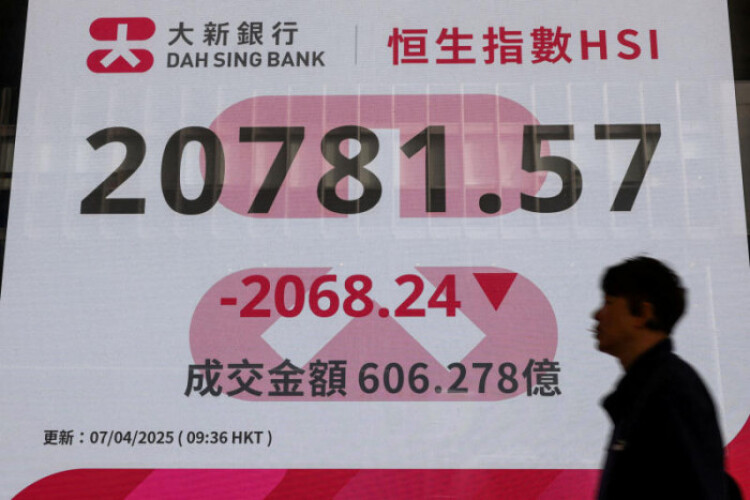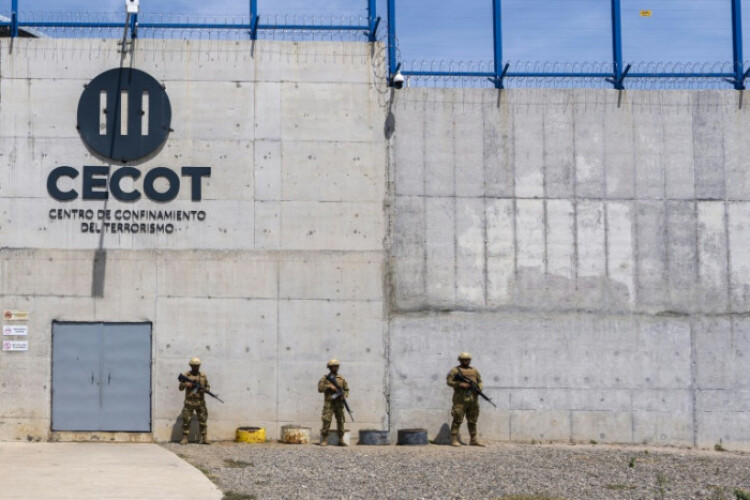
SHANGHAI - Hong Kong and Chinese stocks dived on Monday after Beijing fired back at US tariffs with its own trade levies, sowing more turmoil in financial markets as investors feared a widening trade war would unleash a deep recession.
Hong Kong's Hang Seng index slumped about 9% with tech, solar, banking and online retailers' shares plunging as investors swiftly pulled out of anything linked to global growth and trade.
Hong Kong-listed shares of HSBC tumbled 13% to head for their largest daily fall since 2009 and Standard Chartered stock was down more than 16%, on course for a record fall.
China's CSI300 blue-chip index fell more than 5% with selling engulfing nearly every sector. China's yuan slipped to its lowest since January and bonds rallied sharply.
China, which is now facing US tariffs of over 50%, responded in kind on Friday by slapping extra levies on US imports.
The intensifying spat between the world's two biggest economies threatens to upend trade flows, and besides hitting Chinese earnings, it is also expected to drive a slowdown in global demand at a time of stuttering growth in China.
"I think the impact of this shock is going to be quite significant," said UBS chief China economist Tao Wang on a call with investors on Monday. "It was challenging to achieve the government's growth to start with. And now it's even more challenging."
Trading volumes were heavy, particularly as Chinese markets had been shut on Friday when selling was heaviest in the US and other financial centres.
"The Asia move this morning is partly a catch-up from Friday for markets ... so I wouldn’t say there’s been a disproportionate move today – it’s a blanket risk off," said Ben Bennett, head of investment strategy for Asia at LGIM in Hong Kong.
Mainland indexes of solar companies and household appliance makers notched losses around 10%. Selling was almost as strong in oil and gas shares, as the prospect of a global recession hammered oil prices, and sectors from electric vehicles to cloud computing.
The Hang Seng volatility index shot to its highest since October.
In the absence of any hint of a backdown from the White House, the focus for investors will be on Beijing to come up with measures to support Chinese exporters and shore up the domestic economy.
Shares in online giants Alibaba and Tencent were down more than 10%.
Hong Kong's Hang Seng index slumped about 9% with tech, solar, banking and online retailers' shares plunging as investors swiftly pulled out of anything linked to global growth and trade.
Hong Kong-listed shares of HSBC tumbled 13% to head for their largest daily fall since 2009 and Standard Chartered stock was down more than 16%, on course for a record fall.
China's CSI300 blue-chip index fell more than 5% with selling engulfing nearly every sector. China's yuan slipped to its lowest since January and bonds rallied sharply.
China, which is now facing US tariffs of over 50%, responded in kind on Friday by slapping extra levies on US imports.
The intensifying spat between the world's two biggest economies threatens to upend trade flows, and besides hitting Chinese earnings, it is also expected to drive a slowdown in global demand at a time of stuttering growth in China.
"I think the impact of this shock is going to be quite significant," said UBS chief China economist Tao Wang on a call with investors on Monday. "It was challenging to achieve the government's growth to start with. And now it's even more challenging."
Trading volumes were heavy, particularly as Chinese markets had been shut on Friday when selling was heaviest in the US and other financial centres.
"The Asia move this morning is partly a catch-up from Friday for markets ... so I wouldn’t say there’s been a disproportionate move today – it’s a blanket risk off," said Ben Bennett, head of investment strategy for Asia at LGIM in Hong Kong.
Mainland indexes of solar companies and household appliance makers notched losses around 10%. Selling was almost as strong in oil and gas shares, as the prospect of a global recession hammered oil prices, and sectors from electric vehicles to cloud computing.
The Hang Seng volatility index shot to its highest since October.
In the absence of any hint of a backdown from the White House, the focus for investors will be on Beijing to come up with measures to support Chinese exporters and shore up the domestic economy.
Shares in online giants Alibaba and Tencent were down more than 10%.






